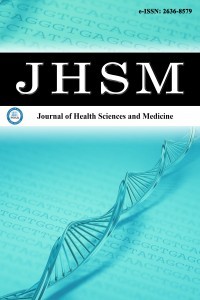The relationship between subclinical hypothyroidism and vitamin D
___
- Makariou S, Liberopoulos EN, Elisaf M, Challa A. Novel roles of vitamin D in disease: what is new in 2011? Eur J Intern Med 2011; 22: 355-62.
- Holick MF. Vitamin D deficiency. N Engl J Med 2007; 357: 266-81.
- Bikle D. Nonclassic actions of vitamin D. J Clin Endocrinol Metab 2009; 94: 26-34.
- Muscogiuri G, Tirabassi G, Bizzaro G, et al. Vitamin D and thyroid disease: to D or not to D?. Eur J Clin Nutr 2015; 69: 291-6.
- Mackawy AM, Al-Ayed BM, Al-Rashidi BM. Vitamin d deficiency and its association with thyroid disease. Int J Health Sci (Qassim) 2013; 7: 267-75.
- Kim D. Low vitamin D status is associated with hypothyroid Hashimoto’s thyroiditis. Hormones (Athens) 2016; 15: 385-93.
- Aldossari K, Al-Ghamdi S, Al-Zahrani J, et al. Association between subclinical hypothyroidism and metabolic disorders: A retrospective chart review study in an emerging university hospital. J Clin Lab Anal 2019; 33: e22983.
- Holick MF, Binkley NC, Bischoff-Ferrari HA, et al. Evaluation, treatment, and prevention of vitamin D deficiency: an Endocrine Society clinical practice guideline. J Clin Endocrinol Metab 2011; 96: 1911-30.
- Jones G. Pharmacokinetics of vitamin D toxicity. Am J Clin Nutr 2008; 88: 582–6.
- Khan N, Sultana S, Mou MH, Sarmin S. Serum Vitamin D Status in Newly Diagnosed Hypothyroid Patients. Bangladesh J Nucl Med 2019; 22: 47-52.
- Elamawy M, Gouda AS. Vitamin D Deficiency in Subclinical Hypothyroid Dysfunction Patients: A Case Control Study. Benha medical journal 2021; 38: 137-145.
- Kivity S, Agmon-Levin N, Zisappl M, et al. Vitamin D and autoimmune thyroid diseases. Cell Mol Immunol 2011; 8: 243-7.
- Tamer G, Arik S, Tamer I, Coksert D. Relative vitamin D insufficiency in Hashimoto’s thyroiditis. Thyroid 2011; 21: 891-6.
- Shin DY, Kim KJ, Kim D, Hwang S, Lee EJ. Low serum vitamin D is associated with anti-thyroid peroxidase antibody in autoimmune thyroiditis. Yonsei Med J 2014; 55: 476-81.
- Mazokopakis EE, Papadomanolaki MG, Tsekouras KC, Evangelopoulos AD, Kotsiris DA, Tzortzinis AA. Is vitamin D related to pathogenesis and treatment of Hashimoto’s thyroiditis? Hell J Nucl Med 2015; 18: 222-7.
- Bozkurt NC, Karbek B, Ucan B, et al. The association between severity of vitamin D deficiency and Hashimoto’s thyroiditis. Endocr Pract 2013; 19: 479-84.
- Arslan MS, Topaloglu O, Ucan B, et al. Isolated vitamin D deficiency is not associated with nonthyroidal illness syndrome, but with thyroid autoimmunity. Scientific World Journal 2015; 2015: 239815.
- Yasuda T, Okamoto Y, Hamada N, et al. Serum vitamin D levels are decreased and associated with thyroid volume in female patients with newly onset Graves’ disease. Endocrine 2012; 42: 739-41.
- D’Aurizio F, Villalta D, Metus P, Doretto P, Tozzoli R. Is vitamin D a player or not in the pathophysiology of autoimmune thyroid diseases? Autoimmun Rev 2015; 14: 363-9.
- Prietl B, Treiber G, Pieber TR, Amrein K. Vitamin D and immune function. Nutrients 2013; 5: 2502-21.
- Hewison M. An update on vitamin D and human immunity. Clin Endocrinol (Oxf) 2012; 76: 315-25.
- Mathieu C, Adorini L. The coming of age of 1,25-dihydroxyvitamin D(3) analogs as immunomodulatory agents. Trends Mol Med 2002; 8: 174-9.
- Baeke F, Takiishi T, Korf H, Gysemans C, Mathieu C. Vitamin D: modulator of the immune system. Curr Opin Pharmacol 2010; 10: 482-96.
- Dankers W, Colin EM, van Hamburg JP, Lubberts E. Vitamin D in autoimmunity: molecular mechanisms and therapeutic potential. Front Immunol 2017; 7: 697.
- Simsek Y, Cakır I, Yetmis M, Dizdar OS, Baspinar O, Gokay F. Effects of vitamin D treatment on thyroid autoimmunity. J Res Med Sci 2016; 21: 85.
- Ucan B, Sahin M, Sayki Arslan M, et al. Int J Vitam Nutr Res 2016; 86: 9-17.
- Mansournia N, Mansournia MA, Saeedi S, Dehghan J. The association between serum 25OHD levels and hypothyroid Hashimoto’s thyroiditis. J Endocrinol Invest 2014; 37: 473-6.
- Barchetta I, Baroni MG, Leonetti F, et al. TSH levels are associated with vitamin D status and seasonality in an adult population of euthyroid adults. Clin Exp Med 2015; 15: 389-6.
- Yayın Aralığı: Yılda 6 Sayı
- Başlangıç: 2018
- Yayıncı: MediHealth Academy Yayıncılık
Murat CİHAN, Abdullah ÜNER, Muhammed Fevzi KILINÇKAYA, Tevfik NOYAN
Selami KARADENİZ, Furkan ERDOĞAN, Alparslan YURTBAY, İsmail BÜYÜKCERAN, Cahit Şemsi ŞAY, Nevzat DABAK
Işılay KALAN SARI, Muhammed Ali COŞKUNER
Elmas UYSAL, Fatih SEĞMEN, Pınar ULUBAŞOĞLU, Emine Nilgün ZENGİN, Deniz ERDEM
Nesrin GAREAYAGHİ, Seher AKKUS, Nur HAMZELİ, Bekir KOCAZEYBEK
Nesrin TUTAŞ GÜNAYDIN, Burak TANYILDIZ
Munire Funda CEVHER AKDULUM, Erhan DEMİRDAĞ, Seçil İrem ARIK, Mehmet ERDEM, Nuray BOZKURT, Mesut OKTEM, İsmail GÜLER, Ahmet ERDEM
Fatih TAŞ, Mehmet YILMAZ, Fikri ERDEMCİ, Fırat AŞIR, Engin DEVECİ
Ertugrul Gazi ALKURT, Doğukan DURAK, Mehmet Berksun TUTAN, Fatih ŞAHİN, İbrahim Tayfun ŞAHİNER
Burcu KORKUT, Pınar KALEM, Habibe İNCİ, Ahmet MİRZA, İshak Oğuz CİNDORUK, Didem SUNAY
